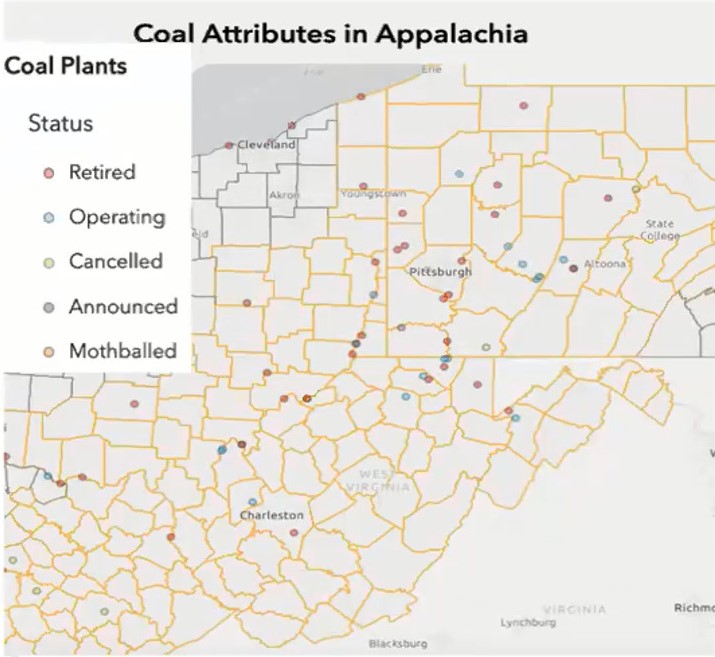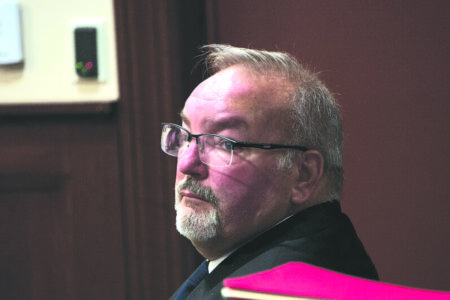Reimagine Appalachia discusses closed coal plants

Reimagine Appalachia hosted a virtual meeting Thursday to discuss the many coal-fired power plants in the area that have been shut down or are going to be shut down. The organization provided information about plants across the Appalachian region including some local plants in Belmont and Jefferson counties. Photo Provided
REIMAGINE APPALACHIA focused on site redevelopment and community revitalization during a virtual meeting Thursday to discuss the many coal-fired power plants in the area that have been shut down or are going to be shut down.
Representatives from several local, county, and regional organizations attended the event to learn more about the possibilities for closed coal plants.
Sam Mardell, manager of carbon-free electricity at Rocky Mountain Institute, said that community feedback is always important when looking at possibilities for the plants.
Amanda Woodrum, co-executive director at Reimagine Appalachia, discussed the impact that coal plants have on communities, specifically the job availability in communities.
“To invest in energy communities is to invest in disadvantaged communities, to create good union jobs and pathways into those jobs for black workers, women and people of color,” she said. “When they close, it is actually pretty devastating to those communities and the workers that lose their jobs. So it becomes very, very important to recognize this and also that we need to be thinking about redeveloping these sites.”
Woodrum said that redeveloping former coal plant sites requires a lot of resilience and focus.
“There are enormous barriers and obstacles to redeveloping these sites. …You only need to look at the collapse of the steel industry to know what happens when you don’t put that energy and those resources into it,” she said.
Woodrum welcomed all attendees and encouraged them to offer feedback.
“We’re really at this point where we’re gonna have to build the plane while we’re flying it. So I challenge everybody here today to both share your knowledge, your experience, and also to listen and learn, because our larger purpose here is to empower community stakeholders to have a say in what these sites become and have the information they need to really participate meaningfully in the process,” she said.
Wendy Patton, assistant professor at Kent State and senior researcher with Reimagine Appalachia, gave a brief overview of each closed coal plant in the Appalachian region, including some local plants in Belmont and Jefferson counties.
Patton discussed the former FirstEnergy R. E. Burger Plant at Dilles Bottom.
“It has gotten a lot of activity over the last seven years because a big international development company, PTT Global Chemical of Thailand, purchased the Burger Plant,” she noted.
She said the plant was retired in 2011, and PTT Global Chemical chose the site for a proposed petrochemical cracker plant.
“There was a lot of money put into this. … So it’s obviously a very risky endeavor. Some sources of media say that they think that this deal is going nowhere,” she said.
PTT Global Chemical America continues to say it is committed to the ethane cracker project but is still seeking a financial partner and has not made a final investment decision.
Patton also discussed the W. H. Sammis Plant in Jefferson County. The plant was partially closed in 2020 and completely closed in June. It is owned by FirstEnergy Solutions, which has since been renamed Energy Harbor.
“The closure was sort of expected, sort of anticipated, but the rapidity with which it happened was not anticipated,” she said.
Patton said that Vistra, an electricity and power company based in Texas, bought the assets of Energy Harbor, and the company is focused on reuse for nuclear and alternative energy.
“W.H. Sammis station is not being evaluated for such uses according to local media reports,” Patton said.
Patton also discussed some local plants that have not closed yet but are slated to close.
She said the Cardinal Power Plant in Brilliant is set to close in 2028. The plant is currently owned by American Electric Power.
“The media does not yet speculate on reuse,” she said.
Patton listed a total of 18 plants that have closed whose sites are currently not in use and four plants that are set to close within the next five years.
Woodrum said many resources exist for communities who are looking to repurpose coal-fired plants. She said coal plant sites have some advantages including land, rail and water access.
Briggs White, deputy director for the Interagency Working Group, discussed some of the financing options available for communities that are looking to repurpose shutdown coal plants. He said that there is over $500 billion worth of federal funding available for these projects.
“Not all of that is earmarked in any way for energy communities, but is either targeted to them in some way or generally relevant to the needs that we hear a lot from energy communities,” he said.
White said more information about federal funding can be found at energycommunities.gov.



